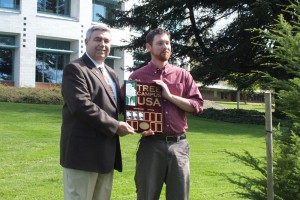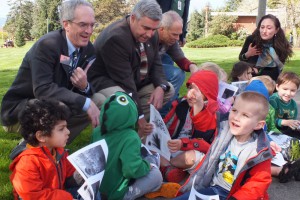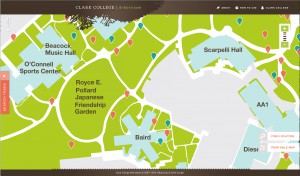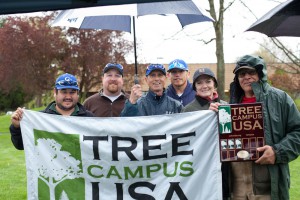Trees and Technology

President Bob Knight receives Clark’s Tree Campus USA award from Ben Thompson of the Washington Department of Natural Resources.
On April 9, Clark College celebrated both the natural and digital worlds at its annual Arbor Day event, as it added two new trees to the campus’s beautiful arboretum and unveiled a new, student-designed website that uses digital technology to catalog that arboretum. The new online map allows visitors to instantly access descriptions of most trees on campus through their mobile devices.
“This website is a great testament to the value of service learning here at Clark,” said Computer Technology Department Chair Robert Hughes at the ceremony, which took place under sunny skies just south of the Chimes Tower. “It showcases the talent of our students, the value of our instruction, and a great part of Clark’s visual landscape.”
The mobile-friendly online map is the product of work done by students in instructor Gus Torres’s spring 2013 Web Design II class. The students worked with the college’s Campus Tree Advisory Committee to identify trees in the campus’s extensive arboretum, which includes such notable trees as a six-decade-old Scarlet Oak and 100 Shirofugen blossoming cherry trees donated to the campus by Japanese businessman John Kageyama in 1990. Students then GPS-tagged each listed tree and added it to the map with information about its genus and species. Additional students contributed to the project in subsequent quarters. Hughes was one of the faculty members who helped support the project, along with Torres, Computer Graphics Technology professor Kristl Plinz, and Computer Technology instructor Bruce Elgort.
The event also featured the official bestowing on Clark of Tree Campus USA designation by the Arbor Day Foundation for the fourth year in a row. Tree Campus USA colleges must meet rigorous standards in five separate areas to earn this designation. The award was presented by a Washington State Department of Natural Resources Urban Forestry Specialist Ben Thompson and received by Clark College President Robert K. Knight.
“It’s very exciting that Clark College has such enthusiasm for urban forestry,” said Thompson, who noted that Clark was helping Vancouver earn a “trifecta” by being a Tree City USA with both a Tree Line USA and a Tree Campus USA. He also noted that Clark’s arboretum might benefit students in unsuspected ways.
“I don’t think it’s a coincidence that so many colleges are located on beautiful campuses filled with trees,” he said. “It puts us at ease, at rest. It makes us ready for learning.”
Clark College Bob Knight agreed. “If our students feel comfortable and our faculty feel comfortable, then it opens up their minds and creativity more,” he said, adding that the new arboretum map was a perfect example of that. “It’s exactly what we want to encourage here at Clark College.”

Children from Clark’s Child & Family Studies program get help on their tree-themed scavenger hunt from, left to right, Dean of STEM Dr. Peter Williams, President Bob Knight, and Campus Tree Committee members Tim Carper and Melissa Favara.
Other speakers at the event included Dean of STEM Dr. Peter Williams and Zahid Chaudry, GIS Program Manager of the U.S. Forest Service Region 6. Additionally, two trees were added to the campus arboretum: an Eastern Hemlock and an Eastern White Pine. These are the official state trees of Pennsylvania and Maine, respectively, and are part of an effort by the college to include all 50 state trees in the campus arboretum; with these two additions, the arboretum contains 39 state trees.
Also present were two classrooms of children from Clark’s Child & Family Studies program, who participated in a tree-themed scavenger hunt and received “seed bombs” filled with seeds of indigenous plants.
Photo: Clark College/Hannah Erickson

